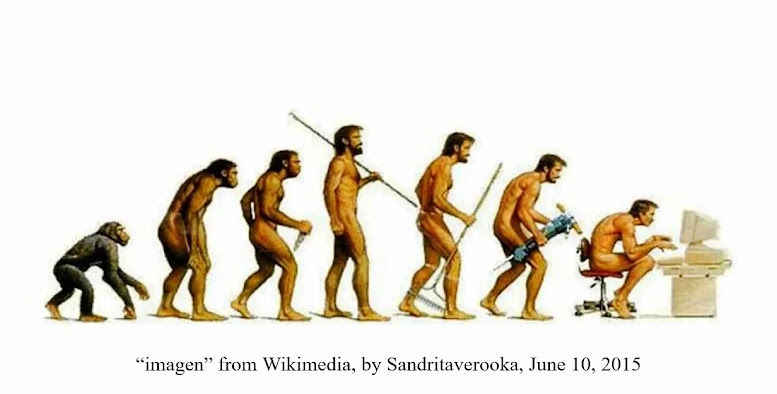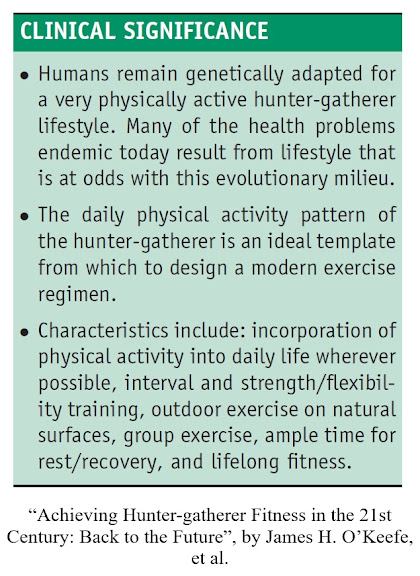Author’s note -- I hope that you enjoy learning from this resource! To help me to continue to provide valuable free content, please consider showing your appreciation by leaving a donation HERE. Thank you and Happy Trails!
To
read part one “Getting Paleo Fit...The Why!©” go HERE
Humans, like bears, are omnivores and
can eat either plants or animals, what is eaten often depends on what is
available. However, ever since Homo erectus,
50,000 generations, or 1.5 million years ago, humans have become more carnivorous,
in fact anthropologists, believe “...that meat-eating has played a
significant role in the evolution of Homo, not just Homo sapiens”.
Up until the end of the Ice Age, 390
generations, or 11,700 years ago, humans were apex predators, and the world was
full of megafauna: mammoths, woolly rhinoceros, cave bears, and more. In modern hunter-gatherer societies today, big-game
hunting is generally a male behavior; but before the end of the Ice Age, it
would have required the participation of everyone, whether driving or
dispatching large megafauna. So, Great
Grandad and Great Grandma, 84,000 years ago, would both have been buff marathon
runners!
We
evolved for movement and exercise and the body remembers, even if we’ve
forgotten. So, what did Great Grandma and
Great Grandpa do, all those generations ago, to keep strong, healthy and
fit? To start with they got up and
walked, everywhere, all the time, every day!
So,
get walking. Get a step counter and see
how many steps you take in an average day, and then set a goal to increase
it. Work up to at least 10,000 steps a
day by adding in blocks of 2,000 steps. 10,000
steps in one go is a walk of an hour and forty minutes, so break it up and
spread it out throughout the day. And
get outside to get your steps in, outdoor exercise gives you sunlight that will
stimulate vitamin D production in your skin.
If possible, walk in a natural setting, since research shows that a 60
minute walk in nature improves memory performance and attention span, compared
to the same length of a walk in an urban setting. And an hour and forty minutes of walking
outside on trails or grass will burn about 400 calories, which over seven days
of walking is about ¾ pounds (340 grams) of fat.
Don’t forget to come back next week and read “Getting Paleo
Fit...Learning How to Stay Alive!©”, where we will talk about what to look for
in an exercise plan to get paleo fit!
I hope that you enjoy learning from this resource! To help me to continue to provide valuable free content, please consider showing your appreciation by leaving a donation HERE. Thank you and Happy Trails!
I
hope that you continue to enjoy The Woodsman’s Journal Online and look for me
on YouTube at BandanaMan Productions for other related videos, HERE. Don’t forget to follow me on both The
Woodsman’s Journal Online, HERE,
and subscribe to BandanaMan Productions on YouTube. If you have questions, as always, feel free
to leave a comment on either site. I
announce new articles on Facebook at Eric Reynolds, on Instagram at
bandanamanaproductions, and on VK at Eric Reynolds, so watch for me.
That
is all for now, and as always, until next time, Happy Trails!
Sources
Agam,
Aviad; Barkai, Ran; “Elephant and Mammoth Hunting
during the Paleolithic: A Review of the Relevant Archaeological,
Ethnographic and Ethno-Historical Records”, Advances in Quaternary Studies:
The Contribution of Mammalian Fossil Record, 2018, Vol. 1, No. 3, https://www.mdpi.com/2571-550X/1/1/3#,
accessed November 23, 2024
Banksy; “Fast Food Caveman”,
from Pyramid America Framed Plexi Posters on Amazon.com, https://www.amazon.com/-/es/Pyramid-America-Caveman-Graffiti-enmarcada/dp/B01NBC0CIB,
accessed November 12, 2024
Ben-Dor,
Miki; Sirtoli, Raphael; Barkai, Ran; “The evolution of the human trophic level
during the Pleistocene”, Yearbook of Physical Anthropology Article, March
5, 2021, https://onlinelibrary.wiley.com/doi/full/10.1002/ajpa.24247,
accessed November 20, 2024
Herzig,
Ilana; “From Hunter to Marathoner”, Archaeology, September/October 2024,
page 19
Hora,
Martin; Pontzer, Herman; Wall-Scheffler, Cara M.; Sládek, Vladimír; “Dehydration
and persistence hunting in Homo erectus”, Journal of Human Evolution, Volume
138, 2020, https://www.sciencedirect.com/science/article/abs/pii/S0047248419300077#:~:text=It%20has%20been%20argued%20that,et%20al.%2C%202009),
accessed November 19, 2024
Hora,
Martin; Pontzer, Herman; Struška, Michal, Entin, Pauline; Sládek,
Vladimír; “Comparing walking and running in persistence hunting”, Journal of
Human Evolution, Volume 172, 2022, https://www.sciencedirect.com/science/article/abs/pii/S0047248422001075?via%3Dihub,
accessed November 19, 2024
Mayo Clinic Staff; “10,000
steps a day: Too low? Too high?”, [© 1998-2024 Mayo Foundation for Medical
Education and Research], https://www.mayoclinic.org/healthy-lifestyle/fitness/in-depth/10000-steps/art-20317391,
accessed November 23, 2024
Nuffield Health; “The
truth behind walking 10000 steps a day”, [© 2024 Nuffield Health], https://www.nuffieldhealth.com/article/walking-10k-steps-a-day-fact-fiction#:~:text=The%20idea%20of%20walking%2010%2C000,and%20the%20idea%20caught%20on,
accessed November 23, 2024
O’Keefe,
Evan L., Lavie, Carl J.; “A Hunter-Gatherer Exercise Prescription to Optimize
Health and Well-Being in the Modern World”, Journal of Science in Sport and
Exercise, Vol. 3, 2021, pages 147 to 157, https://link.springer.com/article/10.1007/s42978-020-00091-0,
accessed November 14, 2024
O’Keefe, James H., et al.;
“Achieving Hunter-gatherer Fitness in the 21st Century:
Back to the Future”, The American Journal of
Medicine, Volume 123, Issue 12, pages 1082 to 1086, https://www.amjmed.com/article/s0002-9343(10)00463-8/fulltext,
accessed November 14, 2024
O’Keefe, James H., et al.; “Cardiovascular Disease
Resulting From a Diet and Lifestyle at Odds With Our Paleolithic Genome:
How to Become a 21st-Century Hunter-Gatherer”, Mayo Clinic Proceedings,
Volume 79, Issue 1, pages 101 to 108, https://www.mayoclinicproceedings.org/article/S0025-6196(11)63262-X/fulltext,
Pires,
M. M.; “The Restructuring of Ecological Networks by the Pleistocene Extinction”,
Annual Review of Earth and Planetary Sciences, May 30, 2024, Vol. 52 No. 1, pages 133 to 158, https://www.annualreviews.org/content/journals/10.1146/annurev-earth-040722-104845,
accessed November 22, 2024
Shideler,
Karen; “10,000-step approach to health really works”, The Hour, July 2,
2002, page A7, https://books.google.com/books?id=5g4hAAAAIBAJ&pg=PA4&dq=%2210,000+steps%22&article_id=4151,144153&hl=en&sa=X&ved=2ahUKEwizzKar7vKJAxVsMlkFHSwvId8Q6AF6BAgMEAI#v=onepage&q=%2210%2C000%20steps%22&f=false,
accessed November 23, 2024
Stein,
Jeannine; “10,000 steps add up to good health”, The Daily Gazette, November 24,
2002, https://books.google.com/books?id=AHwuAAAAIBAJ&pg=PA39&dq=%2210,000+steps%22&article_id=6179,5934209&hl=en&sa=X&ved=2ahUKEwizzKar7vKJAxVsMlkFHSwvId8Q6AF6BAgNEAI#v=onepage&q=%2210%2C000%20steps%22&f=false,
accessed November 23, 2024
The Walking Site; “10,000 Steps A Day”,
[© by TheWalkingSite.Com 1998-2023], https://www.thewalkingsite.com/10000steps.html,
accessed November 16, 2024
Wikimedia; “imagen”, by Sandritaverooka,
June 10, 2015, https://commons.wikimedia.org/wiki/File:Ejemplo_evolucion.jpg,
accessed November 13, 2024









































